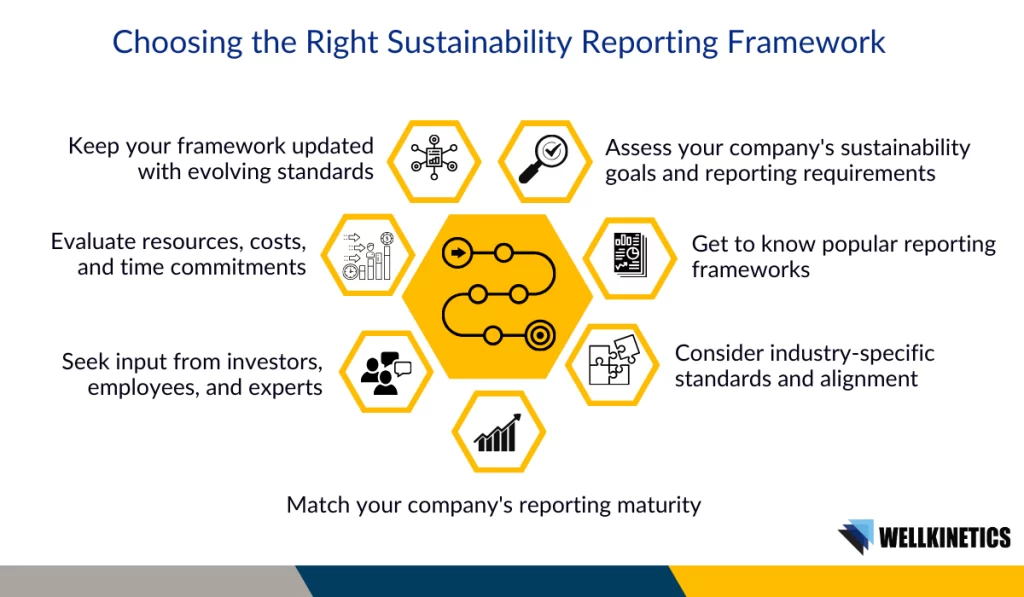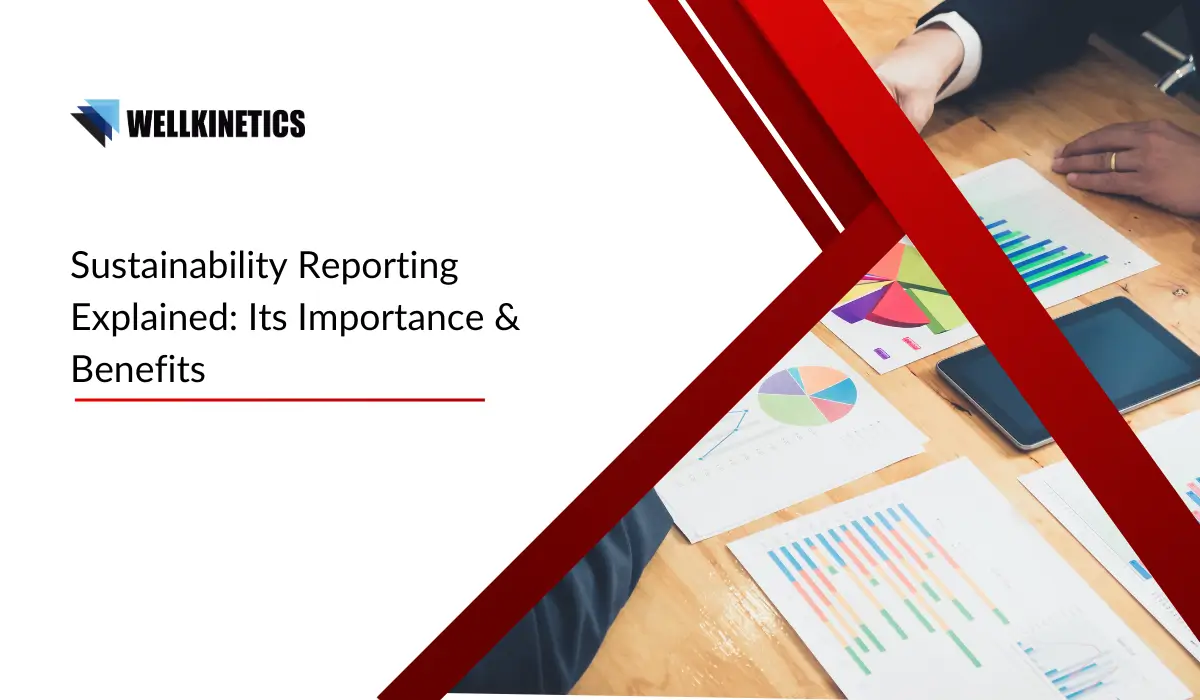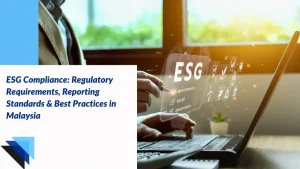In today’s ever-evolving business landscape, sustainability reporting has emerged as an essential practice for companies looking to thrive in a world where environmental and social responsibility are paramount. But what exactly is sustainability reporting, and why should it matter to your business?
This article will take a deep dive into the world of sustainability reporting, offering a comprehensive outlook on its meaning, benefits, and impact on your company’s environmental and social performance. From understanding different frameworks and standards to exploring the nuances of the GRI and SASB, we’ll guide you in selecting the appropriate reporting framework based on your company’s sustainability aspirations.
Read on as we uncover the value of sustainability reporting in today’s world and its significance in shaping a successful and sustainable future for your business.
- Introduction to Sustainability Reporting
- Definition of Sustainability Reporting
- Importance of Sustainability Reporting for Companies
- Frameworks for Sustainability Reporting
- Role of Sustainability Reporting in Risk Management
- Cost Optimization and Savings through Sustainability Reporting
- Decision-Making Support from Sustainability Reporting
- Stakeholder Engagement through Sustainability Reporting
- Choosing the Appropriate Sustainability Reporting Framework
- Looking for Expert Guidance in ESG Reporting? How Can Wellkinetics Help Your Company?
Introduction to Sustainability Reporting
Sustainability reporting has become increasingly important in today’s business landscape as companies recognize the need to address environmental and social impacts while ensuring long-term success. It serves as a means for businesses to communicate their sustainability performance and efforts to stakeholders such as investors, customers, and employees.
The purpose of sustainability reporting is twofold. Firstly, it provides transparency and accountability by disclosing the environmental, social, and governance (ESG) impacts of a company’s operations. This allows stakeholders to evaluate the company’s commitment to sustainable practices and make informed decisions. Secondly, sustainability reporting helps companies identify areas for improvement and set goals for their sustainability initiatives.
Through sustainability reporting, companies can showcase their commitment to responsible and ethical business practices. It allows them to highlight their efforts in reducing their carbon footprint, promoting diversity and inclusion, and supporting local communities. Moreover, sustainability reporting enables companies to stay ahead of regulatory requirements and demonstrate their dedication to addressing the challenges posed by climate change and social issues.
By adopting sustainability reporting practices, companies can align their strategic objectives with the broader goals of sustainability and positively contribute to the global economy. It provides a comprehensive outlook on their sustainability performance and fosters more informed decision-making processes. Sustainability reporting also helps companies identify potential risks and opportunities, allowing for more proactive risk management and the development of action plans to address them.
Key Points:
- Sustainability reporting is essential for businesses today.
- It communicates a company’s sustainability performance and efforts to stakeholders.
- The purpose of sustainability reporting is transparency, accountability, and continuous improvement.
- It enables companies to showcase their commitment to responsible business practices.
- Sustainability reporting aligns strategic objectives with sustainability goals and supports informed decision-making.
- It helps identify potential risks and opportunities for proactive management.
- Sustainability reporting contributes to the overall success and long-term sustainability of companies.
Definition of Sustainability Reporting
Sustainability reporting is a process through which organizations measure, disclose, and communicate their environmental, social, and governance (ESG) performance to stakeholders. It involves collecting and analyzing data on various sustainability indicators, such as greenhouse gas emissions, energy consumption, labor practices, and community engagement.
Sustainability reporting serves as a transparent means for businesses to showcase their commitment to sustainable practices and responsibility. It helps in identifying potential risks and opportunities, facilitating informed decision-making, and fostering trust with stakeholders.
By implementing sustainability reporting, companies can effectively monitor and manage their environmental and social impacts while aiming for long-term sustainability. It provides a framework for companies to assess their progress towards sustainability goals and align their strategies with societal and environmental needs. With sustainability reporting, companies can demonstrate their dedication to corporate social responsibility and build trust among customers, investors, employees, and regulators.
Importance of Sustainability Reporting for Companies
Sustainability reporting is not just a trend or a nice-to-have for businesses; it has become a crucial aspect of corporate operations in today’s world. Companies are increasingly recognizing the importance of sustainability reporting in demonstrating their commitment to environmental and social responsibility. Here are a few key reasons why sustainability reporting is essential for companies and how it contributes to long-term success.
Enhanced Reputation and Trust
By actively engaging in sustainability reporting, companies can build a positive reputation and gain the trust of their stakeholders, including investors, customers, employees, and the wider community. Transparently disclosing relevant environmental, social, and governance (ESG) information through a well-thought-out sustainability report showcases a company’s commitment to responsible business practices. This, in turn, enhances corporate trustworthiness and strengthens relationships with various stakeholders.
Mitigation of Risks
Sustainability reporting plays a critical role in identifying and managing potential risks associated with social, environmental, and governance factors. Through comprehensive reporting, companies gain insights into their environmental impact, potential risks, and gaps in their risk management strategies. This knowledge allows them to take proactive measures to mitigate those risks, ensuring the long-term resilience and viability of their operations.
Long-Term Strategic Planning
Sustainability reporting encourages companies to take a comprehensive outlook on their business strategy. It prompts them to consider the needs and expectations of their stakeholders, as well as the potential social and environmental impacts of their operations. This integrated approach to decision-making enables businesses to align their strategies with the broader societal and environmental context, ultimately driving long-term success.
Competitive Advantage and Financial Performance
Companies that prioritize sustainability reporting often gain a competitive edge in the global economy. Stakeholders, including investors, are increasingly considering ESG factors when making decisions. By demonstrating a commitment to sustainability and providing a comprehensive report on their sustainability efforts, companies can attract investment, enhance their brand value, and ultimately improve their financial performance.
Regulatory Compliance and Legal Requirements
In many jurisdictions, sustainability reporting is becoming a legal requirement. Adhering to relevant reporting frameworks, such as the Global Reporting Initiative (GRI) standards or the Sustainability Accounting Standards Board (SASB) standards, ensures compliance with regulations and helps companies avoid potential legal issues. Furthermore, staying ahead of regulatory developments and incorporating sustainability reporting into business practices positions companies as leaders in their industries.
Frameworks for Sustainability Reporting
Sustainability reporting frameworks provide a structure and set of guidelines for companies to report on their environmental, social, and governance (ESG) performance. These frameworks help standardize reporting practices and ensure transparency and comparability of sustainability information. Here are three popular sustainability reporting frameworks:
Global Reporting Initiative (GRI)
The GRI framework is widely recognized and used by companies worldwide. It provides comprehensive guidelines for reporting on various sustainability aspects, such as environmental impact, social aspects, and economic performance. GRI’s framework enables companies to disclose their sustainability initiatives and impacts in a structured and informative manner.
International Integrated Reporting Council (IIRC)
The IIRC framework emphasizes the integration of financial and non-financial information in reporting. It encourages companies to provide a comprehensive outlook on their business strategy, performance, and governance by linking sustainability and financial performance. By adopting this framework, companies can demonstrate a more streamlined approach to reporting and decision-making.
Sustainability Accounting Standards Board (SASB)
SASB focuses on industry-specific materiality and disclosure of financially material sustainability factors. It provides industry-specific reporting standards that are tailored to the unique risks and opportunities within each sector. SASB enables companies to report on the ESG issues most relevant to their industry and stakeholders, ensuring a more targeted and meaningful disclosure.
By selecting an appropriate sustainability reporting framework that aligns with their goals and stakeholder expectations, companies can effectively communicate their sustainability efforts and better manage their impact on society, the environment, and their long-term success.
RELATED: Sustainability Frameworks: A Guide to Global Standards and Their Application in Malaysia
Role of Sustainability Reporting in Risk Management
Sustainability reporting plays a crucial role in the effective management of risks for companies. By incorporating sustainable practices into their reporting frameworks, organizations are better equipped to identify, assess, and mitigate risks associated with environmental, social, and governance (ESG) factors.
1. Identification of Risks: Sustainability reporting allows companies to evaluate their environmental impact, social responsibility, and corporate governance practices. This comprehensive review of risk management strategies helps identify potential risks that may arise from climate change, regulatory changes, reputational issues, or supply chain disruptions.
2. Enhanced Risk Assessment: Sustainability reporting provides organizations with valuable insights into their operational footprint and the broader impact of their activities. This enables a more comprehensive assessment of potential risks, allowing companies to develop more targeted risk management strategies.
3. Proactive Risk Mitigation: By incorporating sustainability reporting into their risk management processes, companies can proactively address and mitigate potential risks. This includes developing action plans to minimize environmental impacts, assessing the social implications of their operations, and strengthening corporate governance practices.
4. Strengthened Corporate Trustworthiness: Sustainability reporting fosters transparency and accountability, enhancing the trustworthiness of companies in the eyes of stakeholders. In an increasingly socially conscious world, stakeholders, including investors and customers, place great importance on the sustainability efforts of organizations. By addressing ESG risks through comprehensive reporting, companies can bolster their reputation and establish themselves as leaders in sustainability.
Cost Optimization and Savings through Sustainability Reporting
Sustainability reporting not only contributes to environmental and social performance but also serves as a powerful tool for cost optimization and savings. By implementing sustainability reporting practices, companies can identify areas where they can streamline their operations, reduce resource consumption, and minimize waste. This can result in significant cost savings in the long run.
Through sustainability reporting, companies gain a comprehensive outlook on their environmental impact and can develop strategies to improve efficiency. By identifying and addressing inefficiencies in their processes, companies can reduce energy usage, water consumption, and waste generation, leading to direct cost savings.
Moreover, sustainability reporting encourages companies to explore innovative solutions and technologies that can further drive cost optimization. By embracing sustainable practices and incorporating them into the business strategy, companies can enhance operational efficiency and ultimately improve financial performance.
Sustainability reporting also provides companies with valuable insights that can support decision-making. By analyzing data and metrics related to sustainability, companies can identify cost-saving opportunities, prioritize investments, and allocate resources more effectively.
In addition to the tangible financial benefits, sustainability reporting helps companies enhance their reputation and credibility. Demonstrating a commitment to sustainability can attract environmentally and socially conscious customers, investors, and partners, leading to potential business opportunities and partnerships that contribute to financial growth.
By embracing sustainability reporting, companies can not only contribute to a more sustainable future but also optimize costs and enhance their overall financial performance. It is a win-win situation where responsible business practices benefit both the company’s bottom line and the environment.
Decision-Making Support from Sustainability Reporting
Sustainability reporting serves as an invaluable tool for informed decision-making within companies. By providing comprehensive and reliable data on environmental, social, and governance (ESG) factors, sustainability reports enable organizations to make strategic and responsible choices that align with their long-term goals and values.
Reliable Insights for Informed Decision-Making
Through sustainability reporting, companies gain access to a wealth of information that can guide their decision-making processes. These reports offer valuable insights into a range of factors, including a company’s environmental impact, social initiatives, and overall ESG performance. Armed with this data, decision-makers can develop a more holistic understanding of their organization’s operations and identify potential risks and opportunities.
Supporting Strategic Objectives
Sustainability reporting assists companies in aligning their decision-making with their strategic objectives. By identifying areas for improvement and highlighting successes, these reports facilitate a more streamlined and focused approach to achieving sustainability goals. The data provided in sustainability reports allows decision-makers to assess the effectiveness of current initiatives and adjust strategies as needed to drive continuous improvement.
Enhanced Risk Assessment and Mitigation
Sustainability reporting enables companies to conduct a comprehensive review of their risk management strategies. By assessing environmental, social, and governance risks, organizations can proactively identify and address potential threats to their long-term success. This systematic approach to risk management ensures that decision-makers have a clear understanding of the potential risk landscape and can implement appropriate preventive measures.
Strengthened Stakeholder Engagement
Sustainability reporting also plays a crucial role in enhancing stakeholder engagement. By showcasing a company’s commitment to sustainable practices and transparent reporting, these reports foster trust and credibility among stakeholders, including employees, investors, customers, and the wider public. Informed decision-making, backed by reliable sustainability data, demonstrates a company’s dedication to addressing societal and environmental challenges, making it more attractive to stakeholders who prioritize sustainability.
Stakeholder Engagement through Sustainability Reporting
Sustainability reporting plays a crucial role in fostering meaningful engagement with stakeholders, including employees, investors, and customers. By transparently communicating a company’s environmental, social, and governance (ESG) performance, sustainability reports enable stakeholders to make informed decisions and actively participate in the company’s sustainability efforts.
Employees
Employees are increasingly seeking to work for companies that align with their values and prioritize sustainable practices. Sustainability reports provide employees with a comprehensive outlook on their organization’s sustainability aspirations and progress. This fosters a sense of pride and engagement among employees, leading to higher job satisfaction and increased loyalty.
Investors
Investors are placing greater importance on ESG factors when making investment decisions. Sustainability reports provide investors with valuable insights into a company’s environmental impact, social initiatives, and governance practices. This information helps investors assess the long-term viability and financial performance of a company, ultimately influencing their investment choices.
Customers
Consumers are becoming more conscious of the environmental and social impact of their purchasing decisions. Sustainability reports enable companies to showcase their commitment to sustainable practices, enhancing their reputation and appeal to socially conscious customers. By transparently communicating their sustainability efforts, companies can build trust and loyalty among their customer base.
Choosing the Appropriate Sustainability Reporting Framework
Choosing the right sustainability reporting framework is crucial for companies to effectively communicate their environmental, social, and governance (ESG) performance. Here are key considerations to help businesses select the most suitable reporting framework:

Understand Your Needs
Before diving into specific frameworks, assess your company’s sustainability goals, reporting requirements, and target audience. Determine the aspects of ESG reporting that align with your business strategy and stakeholder expectations.
Research Available Frameworks
Familiarize yourself with popular sustainability reporting frameworks such as the Global Reporting Initiative (GRI), International Integrated Reporting Council (IIRC), and Sustainability Accounting Standards Board (SASB). Each framework has its own unique focus and approach to ESG reporting.
Evaluate Relevance and Applicability
Consider the industry in which your company operates and the relevant disclosure standards for that sector. Look for frameworks that address the specific sustainability issues and metrics that matter most to your organization.
Consider Reporting Maturity
Assess your company’s reporting maturity level. If you’re just starting your sustainability journey, frameworks like GRI provide comprehensive guidance and flexibility. More advanced companies may consider integrated reporting frameworks that emphasize the interconnectedness of financial and non-financial performance.
Engage Stakeholders
Involve relevant internal and external stakeholders, such as investors, employees, and industry experts, in the framework selection process. Seek their input and consider their expectations to ensure alignment and credibility.
Assess Reporting Costs and Resources
Evaluate the resources required to implement and maintain each reporting framework. Consider the costs, time commitment, data collection efforts, and internal capacity necessary to fulfill reporting requirements.
Regularly Review and Update
Periodically review and update your chosen framework to ensure its continued relevance and alignment with evolving sustainability standards and regulations. Stay informed about emerging frameworks and industry best practices to optimize your reporting approach.
Remember, selecting the appropriate sustainability reporting framework should align with your company’s objectives, stakeholder expectations, and industry requirements. By choosing the right framework, you can effectively communicate your sustainability performance and contribute to the long-term success and impact of your organization.
Looking for Expert Guidance in ESG Reporting? How Can Wellkinetics Help Your Company?
Wellkinetics is a leading ESG consulting firm that specializes in helping companies navigate the complex world of environmental, social, and governance (ESG) reporting. With their expertise and vast experience, Wellkinetics can assist your company in selecting the most appropriate sustainability reporting framework and guide you through the entire reporting process.
At Wellkinetics, we understand the importance of selecting the right framework to effectively communicate your ESG performance. Our team of experts will work closely with your company to assess your sustainability goals, reporting requirements, and target audience. By understanding your needs, we can identify the aspects of ESG reporting that align with your business strategy and stakeholder expectations.
Our consulting services include in-depth research and analysis of popular sustainability reporting frameworks such as the Global Reporting Initiative (GRI), International Integrated Reporting Council (IIRC), and Sustainability Accounting Standards Board (SASB). We will evaluate the relevance and applicability of each framework to your industry, ensuring that you address the specific sustainability issues and metrics that matter most to your company.
Engaging stakeholders is a critical part of the framework selection process. Wellkinetics will help you involve relevant internal and external stakeholders, including investors, employees, and industry experts, to ensure their input is considered and expectations are met. By involving stakeholders, we can ensure alignment and credibility in your sustainability reporting journey.
As we’ve discussed, ESG reporting can be complex, but with Wellkinetics by your side, you can navigate it effortlessly. Reach out to us today, and let’s streamline your sustainability efforts together. Our experts will guide you in selecting the perfect framework, engaging stakeholders seamlessly, and optimizing your resources wisely.
Say goodbye to reporting headaches and hello to a smoother, more effective ESG journey. Connect with Wellkinetics now to find your sustainable reporting solution.
Check out our Corporate Governance Solutions.




